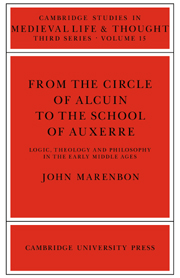 From the Circle of Alcuin to the School of Auxerre
From the Circle of Alcuin to the School of Auxerre Published online by Cambridge University Press: 24 October 2009
I quote the shorter extracts in full; for longer passages, I give the opening and closing words and indicate, in brackets, the contents of the passage. References are to the pages and lines of Sheldon-Williams's edition of the Periphyseon, Book 1. I have provided a more detailed summary and discussion of this material in ‘A Florilegium from the “Periphyseon”’, Recherches de théologie ancienne et médiévale, 47, 1980, pp. 271–7.
I. (f.45ra) Ipse namque essentia est omnium qui solus uere est; ut ait Dyonisius Ariopagita: esse, inquit, omnium est superesse diunitatis. (38:25–7)
II. Angelus est essentialis motus intellectualis circa Dominum rerumque causas. (40:32–3)
III. Qui uocat ea quae non sunt tamquam ea quae sunt. Hoc est, eos qui in primo homine perditi sunt et ad quandam insubsistentiam ceciderunt, Deus Pater, per fidem in Filium suum uocat, ut sint sicuti hi qui iam in Christo renati sunt. (44:18–21)
IV. Teophania: incomprehensibilis intellectualis naturae quaedam diuina apparitio. (cf. 46:17–18)
Deus ANARXOS … (f.45rb) … stabilitatem quaerentia. (God as the beginning, middle and end of all things) (58:22–9)
[…]
To save this book to your Kindle, first ensure [email protected] is added to your Approved Personal Document E-mail List under your Personal Document Settings on the Manage Your Content and Devices page of your Amazon account. Then enter the ‘name’ part of your Kindle email address below. Find out more about saving to your Kindle.
Note you can select to save to either the @free.kindle.com or @kindle.com variations. ‘@free.kindle.com’ emails are free but can only be saved to your device when it is connected to wi-fi. ‘@kindle.com’ emails can be delivered even when you are not connected to wi-fi, but note that service fees apply.
Find out more about the Kindle Personal Document Service.
To save content items to your account, please confirm that you agree to abide by our usage policies. If this is the first time you use this feature, you will be asked to authorise Cambridge Core to connect with your account. Find out more about saving content to Dropbox.
To save content items to your account, please confirm that you agree to abide by our usage policies. If this is the first time you use this feature, you will be asked to authorise Cambridge Core to connect with your account. Find out more about saving content to Google Drive.